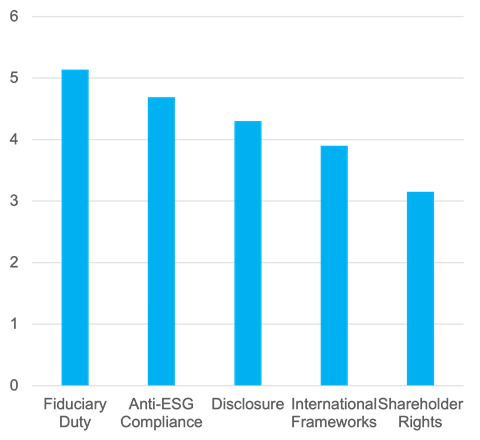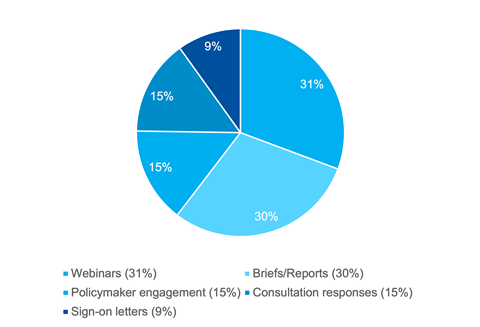By Gregory Hershman, Head, North America Policy

The first half of 2025 has seen a significant shift in the operating environment for the PRI’s US signatories. To find out how investors are responding to the uncertainty that has accompanied the change of government in Washington, the PRI convened a series of roundtables. More than 80 signatories joined nine conversations in New York, Boston, Chicago, Los Angeles.
In this blog, we share insights from these discussions.[1]
Responsible investment practices remain unchanged
Despite concern and uncertainty around the latest domestic policy changes and geopolitical shifts, signatories are not pausing or otherwise walking back their responsible investment activities. For example, they are continuing to:
- integrate material sustainability-related information into their investment decision-making;
- engage with issuers;
- support clients who have specific investment goals.
While actions may not be changing, many roundtable attendees reported reviewing how they talk about responsible investment activities internally and externally. Examples included:
- downplaying work on sustainability, for example by not publishing a corporate social responsibility (CSR) or sustainability report, or not applying for particular awards;
- reducing use of the term “ESG”, favouring “sustainability” or references to specific issues like energy efficiency or water use;
- changing titles to remove “ESG”.
The changing policy environment in the US over the past few years (not just the past few months) has encouraged signatories to be more deliberate in their work – ensuring that what they do and what they say are evidently aligned.
In some instances, signatories reported that increased scrutiny of responsible investment practices had led to positive developments, such as certain activities that were previously tangential becoming core functions, included alongside more traditional investment practices. For example, some attendees noted increased collaboration between “sustainability” or “ESG” teams and legal and compliance functions.
A drive for more targeted engagement
Policy uncertainty is leading to a reconsideration of how investors can best engage in the policy-making process to share their work and needs with policy makers.
- Roundtable attendees said industry initiatives or trade associations would continue to be their main channel for policy engagement.
- There was increased interest in engaging directly with law makers and regulators behind the scenes.
- There was decreased interest in joining public sign-on letter or statements.
Figure 1. What policy areas do you anticipate spending the most time on in 2025? [2]

Many attendees signalled they would be focusing policy efforts on going back to basics. This includes:
- making it clear that responsible investment activities are tied to fiduciary duties on behalf of clients;
- understanding how any new laws or regulations would apply to activities and working diligently to comply;
- advancing ongoing work to comply with growing global alignment on issuer and investor disclosures, specifically citing the European Union’s (EU) disclosure regime.
Beyond the ongoing compliance challenges, signatories acknowledged the growing divergence in regulatory consideration of responsible investment across jurisdictions: between federal and state in the US; between the US and EU; and globally, as nations look to decouple their economies from those of other countries.
How the PRI can support US signatories
Through the roundtable discussions, signatories’ reliance on the PRI as a source of information and connection to the broader ecosystem of responsible investment emerged as a strong theme.
- The PRI’s policy briefs and reports and expert webinars are highly valued by signatories.
- Signatories are increasingly looking to the PRI to distil the broader policy and political universe and explain how it is relevant to their day-to-day work.
Figure 2. What prior PRI policy work has been most useful for your firm?

We are always looking to improve our engagement with signatories as we support them in responding to the pendulum swings of policy. For example, we have:
- set up a signatory-only briefing following SEC guidance on the shareholder engagement process. This session attracted more than 200 attendees and resulted in publication of two briefing documents;
- created a private LinkedIn Group through which we can share real-time updates and views with interested signatories;
- beyond the US, we’ve responded to concerns from global signatories by offering policy briefings across markets, including the EU, Nordics, APAC, Africa, UK, Switzerland and Lichtenstein.
We will continue to seek opportunities to bring signatories together to discuss shared challenges and best practices and we encourage you to get and stay in touch with us via our LinkedIn Group or by email as policy making in the US continues to advance.
References
[1] All data was collected through an anonymised platform. The PRI has afforded attendees anonymity in order to promote open discussion. All attendees were provided the opportunity to review this document prior to publication.
[2] In eight of the nine roundtables attendees were asked six questions using a digital polling tool. Responses were recorded anonymously.












